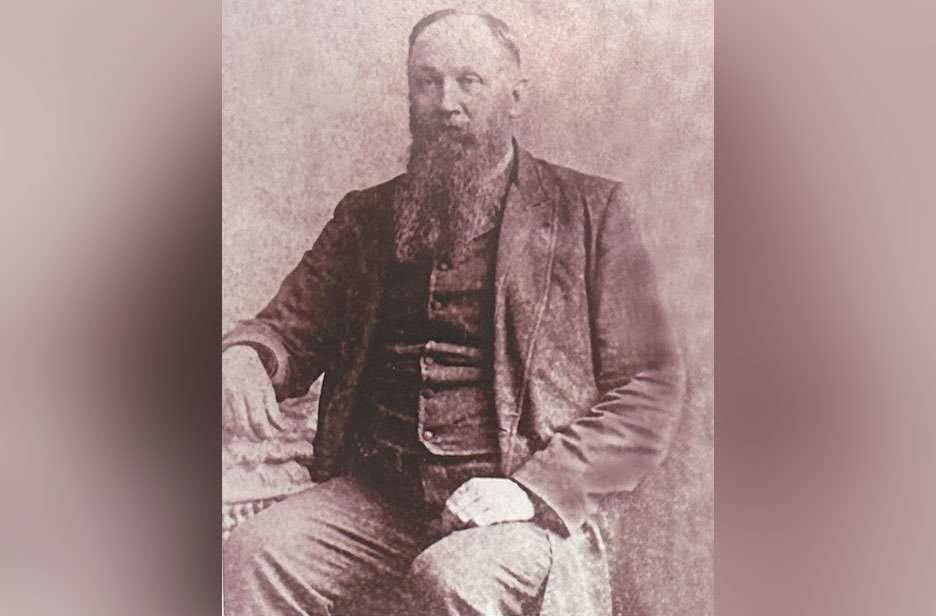Scott County's first school superintendent: James C. Parker
The county's first school superintendent was raised in the Sheep Ranch community in southern Scott County
You’re reading “Echoes in Time,” a weekly newsletter by the Independent Herald that focuses on stories of years gone by in order to paint a portrait of Scott County and its people. “Echoes in Time” is one of six weekly newsletters published by the IH. You can adjust your subscription settings to include as many or as few of these newsletters as you want. If you aren’t a subscriber, please consider doing so. It’s free!
Today’s newsletter is sponsored by the Scott County Chamber of Commerce. Since 1954, the Scott County Chamber of Commerce has advocated for a strong community by supporting stronger infrastructure and leadership.
Meet Scott County’s first superintendent of schools: J.C. Parker
In recent weeks, the Echoes in Time newsletter has spotlighted Scott County’s first sheriff (John Lewallen), Scott County’s first judge-executive (Joshua Duncan), and Oneida’s first mayor (Leland Carson). This week we’re looking at the county’s first school superintendent: James Crawford Parker.
Born and raised in the Sheep Ranch community near Robbins, J.C. Parker would also serve as county mayor, and as a member of the Tennessee judiciary. But his start in politics came as the superintendent of schools in Scott County.
The Scott County School System was formed in 1867 — the same year J.C. Parker married his wife, Mary Burke. Prior to 1867, each community essentially had its own school system; there were 19 of them in 1853, for example. Each school system elected three commissioners, who were responsible for hiring the teachers to serve in their schools.
That all changed in 1867, when Scott County’s schools were moved under the umbrella of a county-wide school system by state statute. The superintendent of schools was appointed by the Scott County Quarterly Court — a precursor to what we know now as Scott County Commission — and served two-year terms.
In those early days, it wasn’t uncommon for school superintendents to only serve a single two-year term before being replaced by the Quarterly Court. In fact, the first person to serve multiple terms was Jasper Q. Cross, who served from 1875 to 1879. The first person to serve more than two terms was Marion Foster, who served from 1901 to 1909. Eventually, in 1924, the state law changed, and superintendent of schools became an elected position. The first man to win election as Scott County School Superintendent was Ovia Cross.
But all of those are stories for another day. Today, we’re focusing on the man who has the distinction of being the first school superintendent: James C. Parker.
His early life
James Crawford Parker was born March 22, 1841, the son of Joel Parker (1818-1900) and Maria Hurt (1821-1901). He was likely born in Wayne County, Ky. — that’s where the Parker family was originally from; where his father grew up before moving to the Sheep Ranch community, which is located off present-day S.R. 52 between Elgin and Rugby.
When the 1840 census was taken, a year before James was born, Joel and Maria Parker lived in Wayne County. Joel had grown up near Parmleysville, in southwestern Wayne County, near the TN-KY border. His parents, James Washington Parker and Nancy Miller — James’ paternal grandparents — are buried in a small cemetery there. In fact, you might remember the drive along Parkers Mountain Road that was part of the first installment of our Sunday Drives series, taking us from Bell Farm to near Pickett State Park. Parkers Mountain was named for the same Parker family.
When the 1850 census was taken, nine-year-old James and his family lived in Morgan County. They had probably arrived in Scott County by that point, Sheep Ranch is located very near the Scott-Fentress county line. Joel and Maria, along with Joel’s brother, William, are all buried in a small cemetery on Sheep Ranch Road — which at that time was the Huntsville-to-Jamestown Road, the main route from Scott County to Fentress County.
When the 1860 census was taken, 19-year-old James was still living at home, working as a school teacher (his father was a farmer). He taught until the Civil War began, then joined Co. I of the 30th Kentucky Cavalry, where he rose to the rank of sergeant. He enlisted on June 25, 1864 and was discharged on April 18, 1865. He did not see major action in the war.
After returning to Scott County, James C. Parker married Mary Burke on Nov. 19, 1867. Mary, born in 1845, was the daughter of Allen and Elizabeth Burk of Wayne County, Ky. The Burk family lived on Rock Creek — near the base of Parkers Mountain — and Allen Burk was a brother to Jonathan Burke, who settled on the Big South Fork River and is the ancestor of all the Burkes living in Scott County today.
James and Mary had nine children: Ella, Albert, Alice, Marie Belle, Ida, Luther, Sam Young, Burdette and John.
His professional life
After spending his late teen years and early 20s as a school teacher, James Parker became an attorney. Like most Scott Countians in those days, he was a Republican and proud of it. Scott County’s politics shifted heavily to the Republican Party when secession happened — Scott County was opposed to secession by the largest majority of any county in Tennessee — and that never changed.
The Parker family moved to Helenwood, where James was a prominent attorney and Mary was the postmaster.
In 1867, Parker was appointed by the Scott County Quarterly Court to serve as the county’s first superintendent of schools. He made a salary of $185 a year — the equivalent of a little more than $4,000 in 2025.
Parker served a single term, then was replaced by Lafayette Sproule, a physician from Kentucky who had married the sister of Julia Marcum, Scott County’s Civil War heroine.
Parker was later elected Scott County Judge in 1883, replacing John Marion Cordell. He served one term, and was replaced in 1886 by Bransford Riseden — a man who had grown up in the same area as Parker, near Rugby.
He was later appointed judge in Tennessee’s 3rd Judicial District, and was elected to the state senate.
Tragedy overcomes the family
James C. Parker’s latter years were mired in tragedy. His beloved wife, Mary, died on Christmas Day in 1885, at the young age of 40. James never truly got over his wife’s death.
Fifteen years later, on Aug. 4, 1900, James’ next-to-youngest son, Burdette, died. The 19-year-old Burdette was a young man with a bright future. He had attended Lexington Business College.
Sickened with grief, James Parker was unable to overcome the death of another son, Sam Young Parker, in 1906.
Sam Parker was following in his father’s footsteps as an attorney. He attended law school at the University of Tennessee, where he was a standout athlete. In fact, the newspapers called him one of the best athletes in the South. He was a fullback on the university’s football team that was the first to beat Alabama in 1904, and was the ace pitcher on the baseball team. He had professional offers as a baseball player, but turned them down to return home to Helenwood.
On July 5, 1906, Sam Parker was gunned down as he stepped off a train at the Helenwood depot after returning from a baseball game in Oneida. The culprit was Judge James E. Fulton, another Helenwood attorney who was an old family friend — who had even boarded at the Parker home. Fulton — who would later be killed by Oneida newspaper editor J.E. Bell amid a feud between the two men over a newspaper editorial that criticized Fulton in his role as the Town of Oneida’s attorney — first claimed that Sam Parker had made advances on his estranged wife. Both Sam, as he lay dying inside his father’s Helenwood home, and his wife, as she lay dying in a Chattanooga-area hospital years later, denied the claim. Then Fulton claimed insanity, saying cigarettes and booze had driven him to kill Sam Parker.
Fulton was whisked off to a Knoxville jail for safekeeping, so he wouldn’t be lynched by an angry mob. In disbelief that an old friend would kill his son, James Parker sent his daughters to implore Fulton’s attorney — a Knoxville lawyer named Jerome Templeton — not to defend Fulton. Templeton was so moved by the girls’ pleas that he dropped the case. Fulton was eventually convicted on a second try and was sentenced to 10 years in prison. But he served just 10 months before having his sentence commuted by Tennessee Gov. Malcolm Rice Patterson.
For James Parker, already heartbroken, the murder of his son was too much to bear. He died three weeks later.
James, his wife, and his two young sons were all buried at Helenwood Cut Cemetery.
Thank you for reading. Our next newsletters will be Threads of Life on Wednesday and The Weekender Thursday evening. Want to update your subscription to add or subtract these newsletters? Do so here. Need to subscribe? Enter your email address below!
◼️ Monday morning: The Daybreaker (news & the week ahead)
◼️ Tuesday: Echoes in Time (stories of our history)
◼️ Wednesday: Threads of Life (obituaries)
◼️ Thursday evening: The Weekender (news & the weekend)
◼️ Friday: Friday Features (beyond the news)
◼️ Sunday: Varsity (a weekly sports recap)





